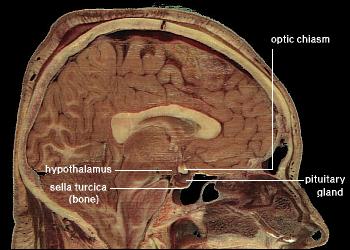 Researchers are continuing to make great progress in unraveling the complexities of aging. While some fingers point to the shortening of telomeres — end caps — in our chromosomal DNA as a contributing factor, other research points to the hypothalamus. This small sub-region of the brain has been found to play a major role in aging and death (though, at the moment only in mice).
Researchers are continuing to make great progress in unraveling the complexities of aging. While some fingers point to the shortening of telomeres — end caps — in our chromosomal DNA as a contributing factor, other research points to the hypothalamus. This small sub-region of the brain has been found to play a major role in aging and death (though, at the moment only in mice).
From the New Scientist:
The brain’s mechanism for controlling ageing has been discovered – and manipulated to shorten and extend the lives of mice. Drugs to slow ageing could follow
Tick tock, tick tock… A mechanism that controls ageing, counting down to inevitable death, has been identified in the hypothalamus?– a part of the brain that controls most of the basic functions of life.
By manipulating this mechanism, researchers have both shortened and lengthened the lifespan of mice. The discovery reveals several new drug targets that, if not quite an elixir of youth, may at least delay the onset of age-related disease.
The hypothalamus is an almond-sized puppetmaster in the brain. “It has a global effect,” says Dongsheng Cai at the Albert Einstein College of Medicine in New York. Sitting on top of the brain stem, it is the interface between the brain and the rest of the body, and is involved in, among other things, controlling our automatic response to the world around us, our hormone levels, sleep-wake cycles, immunity and reproduction.
While investigating ageing processes in the brain, Cai and his colleagues noticed that ageing mice produce increasing levels of nuclear factor kB (NF-kB)? ?– a protein complex that plays a major role in regulating immune responses. NF-kB is barely active in the hypothalamus of 3 to 4-month-old mice but becomes very active in old mice, aged 22 to 24 months.
To see whether it was possible to affect ageing by manipulating levels of this protein complex, Cai’s team tested three groups of middle-aged mice. One group was given gene therapy that inhibits NF-kB, the second had gene therapy to activate NF-kB, while the third was left to age naturally.
This last group lived, as expected, between 600 and 1000 days. Mice with activated NF-kB all died within 900 days, while the animals with NF-kB inhibition lived for up to 1100 days.
Crucially, the mice that lived the longest not only increased their lifespan but also remained mentally and physically fit for longer. Six months after receiving gene therapy, all the mice were given a series of tests involving cognitive and physical ability.
In all of the tests, the mice that subsequently lived the longest outperformed the controls, while the short-lived mice performed the worst.
Post-mortem examinations of muscle and bone in the longest-living rodents also showed that they had many chemical and physical qualities of younger mice.
Further investigation revealed that NF-kB reduces the level of a chemical produced by the hypothalamus called gonadotropin-releasing hormone (GnRH) ?– better known for its involvement in the regulation of puberty and fertility, and the production of eggs and sperm.
To see if they could control lifespan using this hormone, the team gave another group of mice??– 20 to 24 months old??– daily subcutaneous injections of GnRH for five to eight weeks. These mice lived longer too, by a length of time similar to that of mice with inhibited NF-kB.
GnRH injections also resulted in new neurons in the brain. What’s more, when injected directly into the hypothalamus, GnRH influenced other brain regions, reversing widespread age-related decline and further supporting the idea that the hypothalamus could be a master controller for many ageing processes.
GnRH injections even delayed ageing in the mice that had been given gene therapy to activate NF-kB and would otherwise have aged more quickly than usual. None of the mice in the study showed serious side effects.
So could regular doses of GnRH keep death at bay? Cai hopes to find out how different doses affect lifespan, but says the hormone is unlikely to prolong life indefinitely since GnRH is only one of many factors at play. “Ageing is the most complicated biological process,” he says.
Read the entire article after the jump.
Image: Location of Hypothalamus. Courtesy of Colorado State University / Wikipedia.
